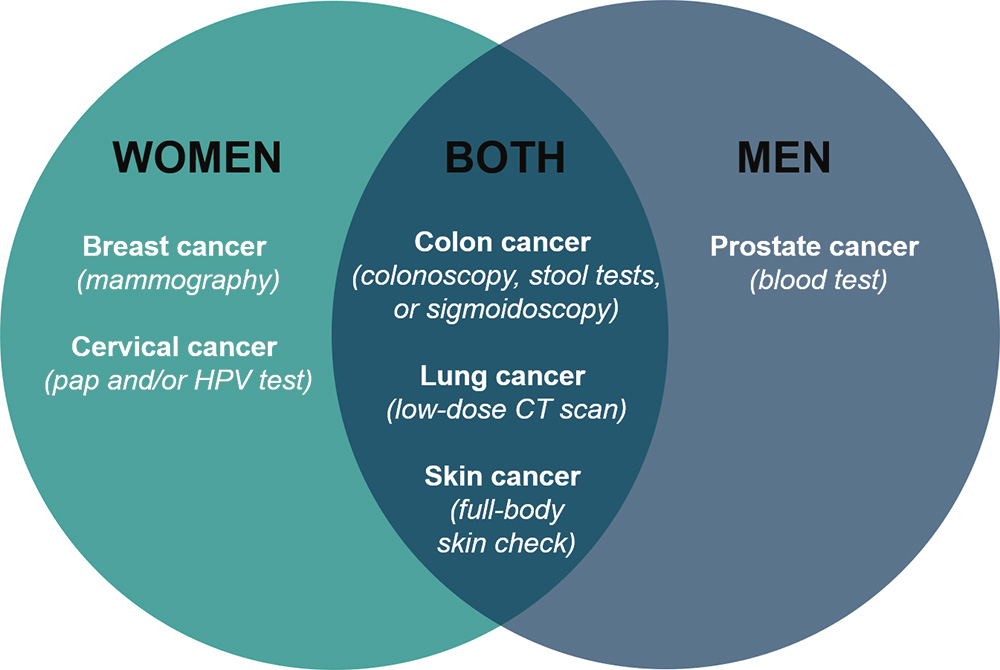Catch cancer early. Get screened today
When it comes to cancer diagnosis and treatment, early detection improves outcomes. Screening tests are used to find cancer in people who have no symptoms. Regular screenings are an essential part of cancer prevention and provide the best chance of finding cancer early when it's easier to treat and cure.
Cancer Screening Guidelines
We've broken down the screening guidelines to make it easy for you to know which are relevant to you. You should discuss these screenings with your primary care physician, who can help determine what is right for you based on your personal and family medical history.

A mammogram is a noninvasive x-ray used to check breasts for breast cancer and other abnormalities. It is the only test shown to reduce breast cancer deaths. Mammograms can detect cancer early — when most treatable — long before it can be felt. This improves odds of survival and can help avoid more extensive treatment.
According to the American College of Radiology, women should get screening mammograms every year starting at age 40. Women should discuss their breast cancer risk and their screening options with their doctor by age 30. For women who have a higher chance of developing breast cancer, screening mammograms may need to start at an earlier age and they may also need supplemental screening examinations such as breast ultrasound, contrast enhanced mammography, or breast MRI.
The Holy Name Breast Center provides the highest standard of care with the latest imaging technology, including 3D mammography.
To schedule an appointment for a mammogram, call 201-833-7100
Cervical cancer is most often caused by HPV (human papillomavirus), the most common sexually transmitted infection in the United States. Most HPV cases are harmless, but a few types can lead to cervical cancer. A pap screening test, which should begin at age 21, can find abnormal cells before they become cancerous. Women should see their gynecologist every year and discuss the appropriate pap screening schedule based on their age and risk factors.
In addition, there is an HPV vaccine that helps protect against the infection (and, thus, cervical cancer). The FDA recommends both females and males get vaccinated up to age 26, starting as early as ages 9 to 11. Talk to your doctor for specific HPV vaccination recommendations for yourself or your child.
To find a Holy Name Physician, visit holyname.org/physician
Colorectal cancer almost always develops from precancerous polyps (abnormal growths) in the colon or rectum. Screening tests can find polyps before they become cancerous. Screening can also find cancer, which if detected early enough, can often be removed completely without further treatment.
General guidelines recommend that adults age 45 to 75 be screened for colorectal cancer. As there are several available screening tests, such as a colonoscopy or stool test, talk to your doctor about when to begin screening, which test is right for you, and how often to get tested.
To find a Holy Name Physician, visit holyname.org/physician
Lung cancer is the second most common cancer and a leading cause of death in the United States. However, lung cancer is highly treatable when detected early.
Lung cancer screening includes a low-dose CT scan, an imaging test that produces detailed images of your lungs. Lung cancer screening is recommended for adults age 50 to 80 years, who have a 20 pack-year smoking history, and currently smoke or have quit within the past 15 years. Pack years are calculated by multiplying the average number of cigarette packs smoked per day by the number of years you smoked.
Holy Name offers a comprehensive lung screening program with a full screening consultation and smoking cessation counseling. The low-dose CT scan is covered by most insurance plans; for those without insurance, the out of pocket expense is minimal.
To schedule an appointment for a lung cancer screening, call 201-833-3000, ext. 5864.
Skin cancer is the most common cancer in the United States. Most cases of skin cancer are caused by overexposure to ultraviolet rays from the sun, damaging skin cells and leading to changes in skin texture, premature skin aging, and sometimes skin cancer.
A full-body skin check by a dermatologist may be used to screen for skin cancer. During a skin exam a doctor checks the skin for moles, birthmarks, or other pigmented areas that look abnormal in color, size, shape, or texture. Talk to your doctor to see if you are at increased risk of skin cancer.
To find a Holy Name Physician, visit holyname.org/physician
Prostate cancer is the most common cancer among men, but it can often be treated successfully if found early. A blood test called a prostate specific antigen (PSA) test can help detect prostate cancer in its early stages.
For men age 45 to 69 years, the decision to get a PSA test should be an individual one. All men should discuss the pros and cons of PSA testing with their doctor to determine what is right for them based on their medical history and risk level.
To find a Holy Name Physician, visit holyname.org/physician

